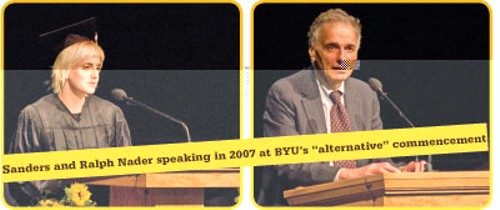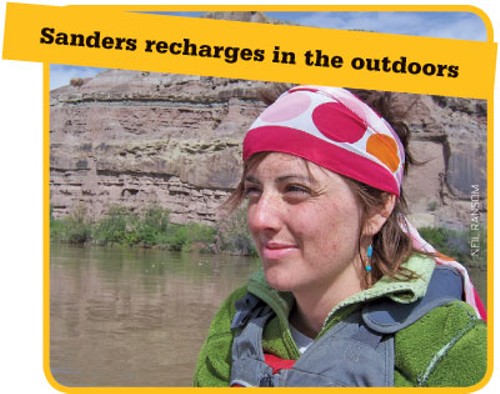As several young men push a big-wheeled circus wagon up the driveway of a small house in South Salt Lake, smiles and applause break out among the gathered political activists. They hurry to open its two shutters. Slogans are painted on each one: “Corporations are not people,” reads one, “Money is not speech” the other.
A passing skateboarder gliding down the street with a friend that early June 2012 evening is unimpressed. “That’s hideous,” he shouts with a sneer.
In a frilly, black flapper outfit, Ashley Sanders smiles tolerantly at the naysayers as they roll by. She and the dozen activists-cum-performers, members of Move to Amend, are premiering a 15-minute mix of skits and puppetry that night at a block party in the Granary District in Salt Lake City. Move To Amend’s national signature campaign, she explains, has two goals: “Pass an amendment to the Constitution that corporations are not people, that money is not speech, and create a democracy movement in the United States.” The street-theater production, where activists play corporate villains, a vain politician and unctuous lobbyists, is Sanders’ brainchild, and despite the chaotic comings and goings of the group, she is very much in charge.
“When she has a vision, she gets people involved and makes sure you’re staying on track,” says Occupy Salt Lake’s Seth Neily, dressed in a Tweedledum-style pair of orange and red trousers.
But even 30-year-old Sanders’ steely will and organizational skills cannot forestall the wagon, pulled by three activists riding bicycles, from breaking down just two blocks from the house where they were rehearsing. As the male performers lift up the wagon and work on the broken axle, Sanders, driving a large SUV, watches at the corner, gritting her teeth. “Fun times,” she says, as her fellow activists gingerly pull the repaired wagon along the streets.
Sanders is one of a small group of “rising lights” from Salt Lake City—others include the co-founders of Peaceful Uprising, Tim De Christopher and Ashley Anderson, and its national organizer, Henia Belalia—who have achieved prominence among those driving social change nationally, says David Cobb, 2004 Green Party U.S. presidential candidate and Move to Amend national spokesman. If the 1960s protest movement was activism 1.0 and the 1980s Anti-Apartheid Movement activism 2.0, then Sanders, he says, represents activism 3.0, “the post-modern, engaged citizen activist.”
In Sanders’ world, where earnest truth-telling sits beside a love for costumes, parties, personality tests and “junior high school crush games,” she says that “justice is the baseline, not the end. The end is to perpetually create beautiful communities.” Her dream is communities designed “for everyone, so everybody has beauty in their lives, with houses and gardens. I think I’m an artist who accidentally became an activist.”
While capable of eloquently expounding at great length on politics and activism, she says the day-to-day matters of e-mails, returning telephone calls and keeping budgets elude her. Though perpetually broke—“She’s not quite able to have what would be typically termed a job,” says friend and fellow activist Kate Savage—and currently residing with her parents, Sanders has undoubtedly crammed much into her 30 years.
At Brigham Young University, she not only radicalized both herself and many students uncomfortable with the college’s rigid hierarchy and politics, but was also a driving force in the 2007 headline-grabbing alternative-commencement ceremony, organized in response to Dick Cheney being the speaker at that year’s BYU’s official commencement. She worked in high-profile positions for both Ralph Nader and, briefly, Rocky Anderson’s nonprofit, High Roads for Human Rights. Then, after an eight-month stint at a Californian activist collective, she returned to Salt Lake City as a member of Peaceful Uprising and, now, Move to Amend.
It’s been a painful struggle, in both her personal and political life, to combine her aesthetics and her political principles into a life-changing force. In politics, she found many activist groups to be hypocritical. “They say they’re feminist, but they’re not, because men are in charge. They say they’re egalitarian, but they’re not. Someone is in charge, but they don’t say that, and that makes it dangerous.”
She’s also struggled to come to terms with herself as an ex-Mormon who still loves many of the traditions of her former church and faith. “Mormonism is the thing that most informed who I am, all of my activism—but it’s also been one of the most major sources of heartache for me,” she says.
Sanders’ commitment to truth-telling—“I do not feel like a fully alive human being unless I’m speaking and articulating ideas to people,” she says—inevitably leads her to a fundamental contradiction: “If you speak your truth, you face losing your audience. But if you keep your audience, you can lose your truth.”
Some veteran members of the activist community, as much as they admire Sanders’ energy and eloquent zeal, question whether she’s making enough of an impact. “Ashley, in my dealings with her, struck me as being a little more radical than the whole MTA thing,” says longtime Utah activist Diana Lee Hirschi. She recalls with fondness Sanders’ and Savage’s colorful staging of The People’s Bribe at the 2009 Utah Legislature, where fellow activists dressed up as lobbyists for environmental causes—one activist was a Lorax, representing trees—and gave a “bribe” to a fake politician. But Hirschi shakes her head at Move to Amend. “You get a whole lot of people running around gathering petitions, thinking they’re making a difference, and they’re not.” While Sanders is “a wonderful, creative person, she’s not getting her hands dirty.”
Kate Savage sees the often painfully self-aware Sanders as carrying many of the same contradictions that Utah carries, “in the sense that she is at home here, yet never comfortable. In Utah, there are incredibly warm people who are profoundly racist. The deep complexities of Utah, that’s the ocean she swims in.” She says that Sanders is at a transition point. “She’s trying to figure out whether to have a decent life or keep fighting, create her own beautiful private life or destroy her peace of mind in trying to make things better for everybody.”
LOVE IS NOT ENOUGH
Sanders is one of six children born to devout Mormon parents, her father a dermatologist, her mother a homemaker. “The people close to me are excellent examples of Mormons and Christians,” she says about her family. “In a very real way, my whole life has been a riff on Mormonism, rebelling against my parents, yet rebelling with what I inherited from them,” she says. That inheritance, in essence, was that Mormonism “teaches you tell the truth all the time, teaches you that it doesn’t matter what other people think. It matters that you’re true and in that state of authenticity—you’ll move people.”
As a teenager, her passion for activism was rooted in environmental concerns, be they urban sprawl, big-box stores or the pollution-laden Salt Lake City skies. Stuck in a winter traffic jam on Interstate 15, she had an epiphany. “Why feel powerless?” she thought. So she and her boyfriend walked to nearby idling cars, knocked on windows and asked drivers to turn off their engines.
After Sanders graduated from East High, she attended a semester at the University of Utah, but found herself wanting “something different.” Her father suggested she try the LDS Church-owned BYU in Provo. “I had the typical Salt Lake City sass about BYU. It was so white-bread Mormon. I thought it was where the fun people went to die.” Despite such insights, she nevertheless attended and has been rehearsing answers to the question “Why?” she adds ruefully, for the past 10 years.
More by Stephen Dark
-
Call it a Comeback
Long mired in economic depression, Midvale’s Main Street dusts off its small-town charm.
- Sep 20, 2017
-
Love Letters
Correspondence between a young woman at the Topaz internment camp and her beloved sheds light on Trump's America.
- Sep 6, 2017
-
Triggered
Veterans Affairs exists to help vets. So why did the Salt Lake VA appoint an anti-veteran chief?
- Aug 30, 2017
- More »
Latest in Cover Story
Readers also liked…
-
Forget the family pedigree—Robert F. Kennedy Jr should not be the next president of the United States
Trojan Horse
- Jun 21, 2023
-
Women decry harassment and toxic culture at St. George auto dealership
Men at Work
- Oct 11, 2023







